Considering a Kindle Fire tablet/ereader for Christmas? Check out these reviews:
Kindle Fire Usability Findings
http://www.useit.com/alertbox/kindle-fire-usability.html
Review by Jakob Nielsen, usability expert.
Summary: Mobile web sites work best on the 7-inch tablet. Users had great trouble touching the correct items on full sites, where UI elements are too small on the Fire screen.
AmazonÔÇÖs New Kindle Fire (Guest Post)
http://www.lhl.uab.edu/tech/?p=637
Review by Susan Smith, librarian at Lister Hill Library, Univ. of Alabama – Birmingham.
Summary: “the Kindle Fire is fun and useful ÔÇô especially for entertainment purposes. For anyone not wanting to spend $500 for an iPad, I think this is a great alternative.”
(Thanks to Lin Wu for the heads up!)
You can now register the same Dynamed serial number on up to 5 devices of the same operating system.
From Skyscape:
For example, if you have registered DynaMed on your iPhone, you can install it to your iPad using the same serial number. When you install Skyscape/DynaMed on the iPad, all of the resources that were registered to your iPhone are automatically installed. This behavior will also apply to the Android and BlackBerry platforms.
Serial numbers have a shelf life of one year, regardless of how many devices on which it is registered. Contact the library for a new serial number if Dynamed has stopped working for you.
Dynamed provides clinically-organized summaries with references for nearly 3,200 diseases and condition topics and over 800 drugs. It is available free to faculty, staff and students of LSUHSC.
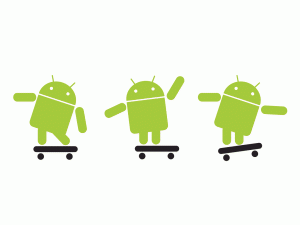 Micromedex Drug Information is now available for Android phones.
Micromedex Drug Information is now available for Android phones.
We’ve previously mentioned the Drug Information app for Blackberry and iPhone way back in January 2010, it’s nice to see this drug information app for that *other* mobile operating system.
Just a reminder that Dynamed serial numbers have a shelf life of one year. If you downloaded Dynamed to your smartphone about a year ago, it may be time to renew your serial number. (The app will tell you when your serial number has expired.)
Renewing is simple. Just email reference@lsuhsc.edu or call 504-568-6100 to request a new serial number and then enter it into the app on your phone.
More info on Dynamed: http://www.lsuhsc.edu/no/library/ss&d/data/dyna.html
Embryo is new app for iPhone, iPod Touch and the iPad from the NLM. This app provides a collection of digital serial sections of early stage human embryos for mobile devices. Features include human fertilization videos, photo micrographs of early-stage embryo development, 2D and 3D digital images using visual stack dissections, and a pregnancy calculator.
Embryo is especially cool because LSUHSC-NO scientists were involved in it’s creation. The app is a collaborative project between the NLM, the Eunice Kennedy Shriver National Institute of Child Health & Human Development (NICHD), the Virtual Human Embryo Project at LSUHSC-NO and the National Museum of Health & MedicineÔÇÖs Human Developmental Anatomy Center.
The Virtual Human Embryo Project was developed in the early 2000’s as a collaboration between embryologist Dr. Raymond Gasser at LSUHSC and the Human Developmental Anatomy Center in Washington DC. Dr. John Cork at LSUHSC joined the project at its inception as the software developer with a special interest in 3D-reconstruction. The images generated from the earlier project provide the basis for Embryo.
More information and screenshots from iTunes.
 |
|
Diagnosaurus is a popular differential diagnostic tool with a catchy name. LSUHSC users have multiple access points to search its content: |
If you are On Campus then simply go to AccessMedicine and then click on DDX in the menu bar.
If you are Off Campus then go to the link from the Library’s webpage and enter your off-campus information. Again, follow the DDX link.
If you are on a Handheld/Mobile Device with Web Access, then create a my AccessMedicine account while on the AccessMedicine page from a non-mobile device. Go to AccessMedicine on your mobile web browser and login. Diagnosaurus is in the list of choices.
If you are on a Handheld/Mobile Device with Web Access and want an App Download, go to the UnboundMedicine website. Downloads are free for Palm, Windows Mobile, and Blackberry and are 99¢ for iOS (iPhone/iPod Touch/iPad), Android, and Windows Phone 7. An internet connection is still necessary to access the data.
AccessMedicine, the popular resource that includes the full text of Harrison’s Online, diagnostic tests, and much more is now optimized for your mobile device!
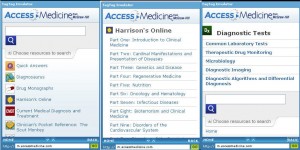
To log in, go to m.accessmedicine.com on your mobile browser and log in with your MyAccessMedicine user name and password.
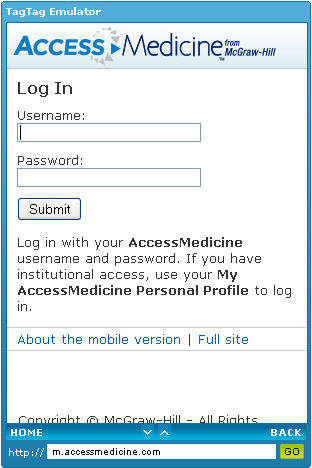
Don’t have a MyAccessMedicine user name and password?
You can create one through the Access Medicine homepage. Simply select “MyAccessMedicine” on the right side of the screen and follow the directions.
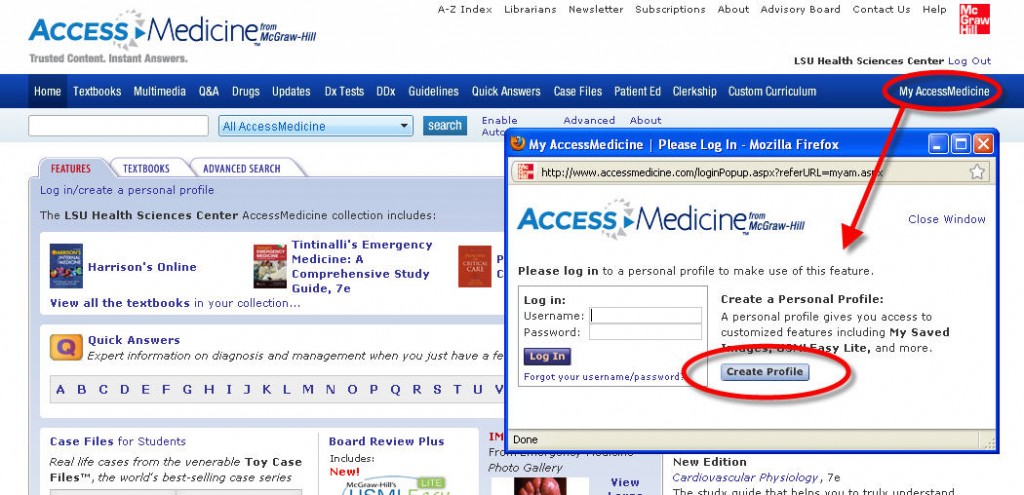
Questions? Contact mknapp@lsuhsc.edu
iMedicalApps.com has updated their list of free top medical apps for iphone and raised the number to 20.
Top 20 Free iPhone Medical Apps For Health Care Professionals
The list is a mixture of news, point of care resources, and non medical but useful apps for iPhone and in some cases, iPad.
Notes:
LSUHSC has an extended subscription to Micromedex, while the free app SkyScape also runs our subscription to Dynamed and Natural Standard. Email mknapp@lsuhsc.edu for install information.
Also listed is ePSS – a public health tool from AHRQ that displays screening measures derived from the USPSTF based on patient demographic information, and Doximity, a “Facebook for doctors” – for those that need yet another social networking service.
Bottom Line
Although it’s a little annoying to have to click through 20 pages to see them all, it’s a good list (and you can’t beat the price).
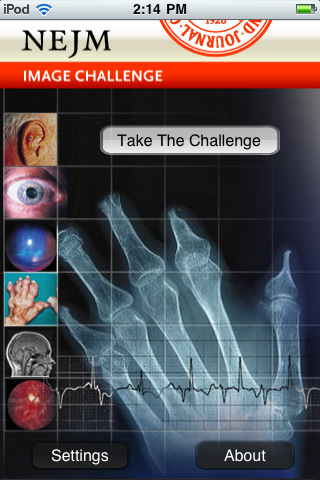 The New England Journal of Medicine has just released a new app version of their popular “Image Challenge” weekly email feature. Test your diagnostic and visual skills any time, any where with this $2.99 application.
The New England Journal of Medicine has just released a new app version of their popular “Image Challenge” weekly email feature. Test your diagnostic and visual skills any time, any where with this $2.99 application.
Available on iTunes.
Web version
imedicalapps.com is reporting that Kaplan publishing, producers of such favorite books as Kaplan Medical USMLE Step 3 Qbooks is offering 19 FREE medical books via the Apple Bookstore until August 30th.
More info & screenshots at imedicalapps.com
You may not have the Step on your radar right now, but rest assured, time marches on. This offer ends August 30th, so get your books while you can!
Epocrates is offering a free download of their Essentials package (usually $159) for medical students until August 31st. Users must have iPhone?«/iPod?« touch, BlackBerry?«, Palm OS?« or Windows?« Mobile platforms – Palm Pre & Android users are out of luck.
We aren’t sure what the catch is, but you know how the saying goes, you can’t get something for nothing.
Download here:
http://www.epocrates.com/ma/FreeforMedicalStudents2010/
Looking for a mobile app to diagnose musculoskeletal injuries and disorders? Clinically Relevant Technologies has developed an application for both iPhone and Android which includes descriptions, demonstrative video clips, and references from the medical literature for over 200 musculoskeletal diagnostic tests.
What I like about it is that every test is referenced back to a clinical citation. Tests must meet three main criterion for inclusion:
1) The test must be described/referenced in a peer-reviewed medical journal
2) The test must be used in the evaluation and diagnosis of musculoskeletal pathology
3) The test would be performed by the clinician or as part of clinical evaluation (not include laboratory or diagnostic imaging tests for example).
At $39.99, this app isn’t the cheapest, but as iPhone App review points out, “an equivalent text would cost several-fold more and cannot offer the same portability and ease of use”.
For screen shots and more info, check out i Medical Apps.
Available for iPhone and Android platforms
http://www.clinicallyrelevant.com/
A new list of the Best Android apps for Doctors, Nurses and Health Care Professionals indicates that flashcards, games and glossaries are popular in the android app field. Don’t forget, you can use Skyscape to access Dynamed & Natural Standard with a serial number from the library.
Mobile Resources from the library.
Free for a limited time! This new iphone app pushes recent content from the New England Journal of Medicine including:
ÔÇó Articles published online in the last seven days, including the current issue and Online First
ÔÇó Classic Images in Clinical Medicine
ÔÇó Weekly audio summaries
ÔÇó A selection of four full-text audio reads of Clinical Practice articles
ÔÇó A selection of four procedure videos from the Videos in Clinical Medicine series
Access NEJM This Week on iTunes.

 myLSUHSC
myLSUHSC



 The New England Journal of Medicine has just released a new app version of their popular “Image Challenge” weekly email feature. Test your diagnostic and visual skills any time, any where with this $2.99 application.
The New England Journal of Medicine has just released a new app version of their popular “Image Challenge” weekly email feature. Test your diagnostic and visual skills any time, any where with this $2.99 application.